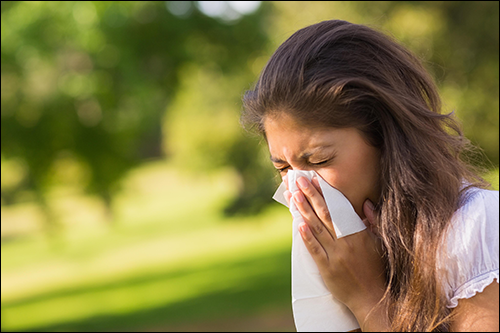Top 4 Natural Remedies for Allergy Relief
Abstract
Allergy is a common problem that occurs when the immune system of our body reacts to any foreign substance. Otherwise, these foreign substances do not cause any harm to the body, if the immune system is healthy enough. Planet Ayurveda offers 4 effective herbal remedies for allergy.

What are the symptoms?
The symptoms depend on the site and the type of foreign substance.
The foreign substances that cause allergy are known as allergens. The reaction due to these allergens may be mild to severe. Allergy may sometimes, cause life threatening reaction also. So it must be treated well.
Here we are discussing several different types of allergies
Different types of allergies and their symptoms
Allergic Rhinitis
Hay fever is another name of this type of allergy. The common symptoms of this allergy may include-Sneezing, Running nose, as well as itching on the nose, eyes and in the mouth as well. Redness and swelling in the eyes may also appear and the condition is known as conjunctivitis.
Food allergy:
Food allergy occurs due to food and the symptoms are swelling in the lips, tongue and throat as well. Hives, anaphylaxis and hives are other main symptoms of this allergy.
Insect sting allergy
Allergy may also occur due to the insect sting. Swelling on the sting area may occur. Itching may occur all over the body. Hives, Cough and chest tightness may also occur.
Drug allergy
Allergy that occurs due to some medications and drugs is known as drug allergy. Swelling, itching, shortness of breath are some of the primary symptoms of this type of allergy. Rashes may also occur.
Atopic dermatitis
Atopic dermatitis is a type of skin allergy. The condition is often known as eczema. Itching and redness over the body are the main symptoms.
Causes
There are several causes of allergy. When our immune system is weak, then a person exposed to allergen may easily get allergy.
There are some common allergy triggers that are listed below
- Pollen, dust mites and animal dander are some of the common airborne allergens that trigger allergy.
- Foods such as wheat, soy, fish, eggs and peanuts may cause allergy in some.
- Some medicines such as penicillin or other antibiotics are also responsible for the allergy.
- Insect stings are also one of the cause of this problem.
Risk factors of Allergy
Here are some risk factors that may pose a person at high risk of allergy
Family history- A person having a family history of any kind of allergy is at higher risk of developing any allergy problem.
Age- Children as compared to adults are at higher risk of allergy.
Asthma- asthma affected person is also at higher risk of getting any kind of allergy.
When to call a doctor?
If you experience any above mentioned allergy related symptoms, then it is the time to call your doctor. If you experience any allergy to medications, then call your doctor who prescribed it.
Planet Ayurveda’s Herbal treatment for Allergy
Planet Ayurveda offers 4 effective herbal remedies for allergy.
These are well described below
1. Aller G care
Aller g care capsules of Planet Ayurveda are made using a special combination of some wonderful herbs. These herbs include Curcuma longa (Haridra), Azadirachta indica (Neem), Albezzia lebbock (Shirish) and Ashwagandha (Withania somnifera).
Allergy occurs due to lack of good immunity and the herb Curcuma longa helps to boost the immunity and hence helpful in managing allergies. The herb Neem works well on allergies and infections, by acting as a disinfectant. It has a good cleaning action on our body systems. It works very well on insect stings. The herb Ashwagandha is another added advantage of this formulation. Due to its rejuvenating properties, the herb also works very well on every type of allergy. Shirish herb is here to remove the ama (toxins) from the body and helps to improve the immune system.
Overall, the combination of these herbs serves as a great one to cure any type of allergy.
Pack size- Each bottle contains 60 capsules in it.
Dosage-2 capsules, two times a day, with plain water, after meals.
2. Praanrakshak churna
Praanrakshak churna from the house is made using the blend of several important Anti-allergy herbs. These include Shirish (Albezzia lebbock), Vaasa (Malabur net), Anantmool (Sarasprilla), Dalchini (Cinnamon), Bharangi (Clerodandrum) and Mulethi (Licorice).
Shirish herb as already discussed is helpful in removing accumulated poisons from the body, thereby cleans the body system. While the Vaasa herb is useful in respiratory allergies. Anantmool is known as a natural blood purifier and hence a great way to clean the blood and thereby helpful in managing allergies as well.
The powder is another great herbal remedy for allergy.
Pack size- Each bottle contains 200 g of powder in it.
Dosage – 2 teaspoonful, three times a day, with plain water, after meals.
3. Tulsi capsules
Planet ayurveda’s Tulsi capsules are made using the pure and standardized extracts of Tulsi (Ocimum sanctum) plant. A very beneficial plant used frequently in Ayurveda for various health purposes including allergy.
The herb Tulsi is known to be a strong anti-allergic and anti-inflammatory. And hence the great one to cure respiratory allergies. The herb possesses immunomodulatory properties that help to boost the immune system. Due to its antibacterial and anti-fungal properties, the herb is a great choice to fight against infections.
Pack size – Each bottle contains 60 capsules in it.
Dosage – 1–2 capsules, two times a day, with plain water, after meals.
4. Curcumin capsules
Curcumin capsules are another great herbal remedy for allergy from the house. The house made these capsules using the pure extracts of Curcuma longa (curcumin).
The herb curcumin is best known for its anti-inflammatory properties and hence a great choice to manage allergies. It helps to boost the immunity as well and hence an added advantage. The herb possesses anti-biotic properties that make it a strong option for fighting against toxins and any kind of infection. The herb also has a cleaning action on the body and has beneficial actions on skin allergy.
Pack size- Each bottle contains 60 capsules in it.
Dosage – 2 capsules, two times a day, with plain water, after meals.
Why Planet Ayurveda?
Planet Ayurveda has several advantages that are listed below
- All the products from the house of Planet Ayurveda are 100 percent pure and natural.
- All of the products by Planet Ayurveda are prepared without the addition of chemicals or additives or preservatives.
- All of them are safe to use.
- All of them are free from side effects.
- All of these are 100 percent vegetarian.
- These are formulated by MD Ayurveda doctors.
Contact Planet Ayurveda Support Team to provide you the costing/ordering and delivery information at costing.planetayurveda@gmail.com or Call at 0172-521-4040 (India), +91-172-521-4040 (Outside India) or Whatsapp at (+91) 842-749-4030.




